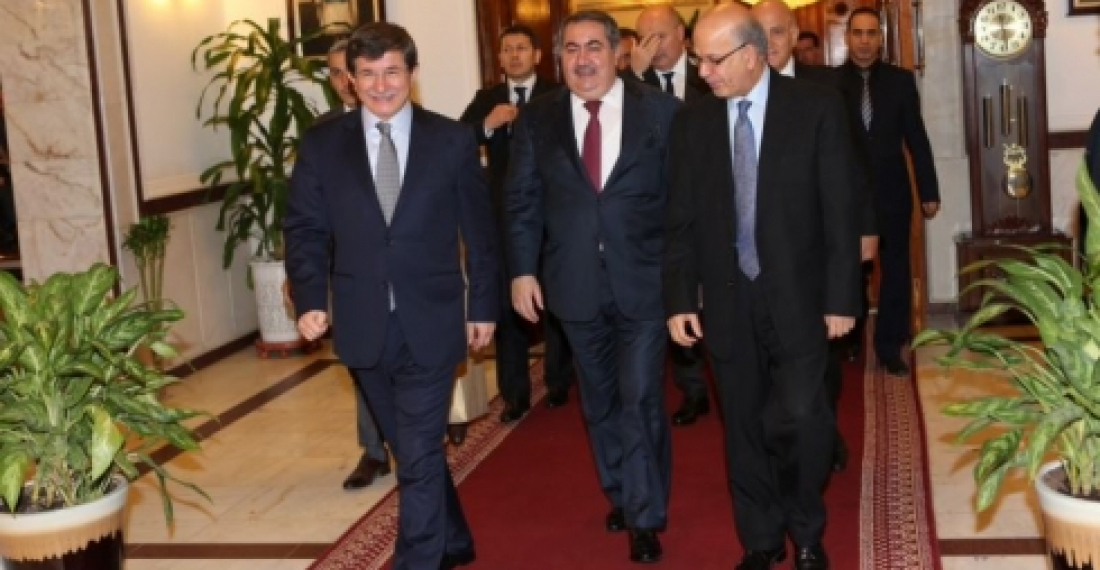President Ilham Aliev of Azerbaijan travelled to Ankara on Monday at the start of an official visit during which he will participate in a meeting of the High Azerbaijani-Turkish Intergovernmental Commission which is chaired by the leaders of the two countries, and which oversees relations between them.
The meeting comes in a week when senior Turkish officials are engaged in meetings with neighbouring countries.
Foreign Minister Ahmit Davutoğlu was in Iraq where he met senior officials including Prime Minister Maliki. Davutoğlu also travelled to the religious centre of Najab where he met the senior Shia cleric of Iraq, Ayattolah Sistani. Turkish media report that Sistani and Davitoglu spoke about issues related to water."Al-Sistani complained about Turkey's cutting of the flow of water into Iraq and Turkey's construction of dams on these rivers," a source familiar with the talks told the Hürriyet Daily News.
The rivers in question, the Euphrates and Tigris, both begin in Turkey and pass through Syria and Iraq before emptying into the Persian Gulf in Basra. Al-Sistani said Iraqis were suffering from water shortages and that the issue should be resolved through bilateral mechanisms and, if subsequently necessary, through U.N. arbitration.
Davutoğlu explained Turkey's position with regard to water allowance to neighboring countries, but al-Sistani was unconvinced, according to the source. Davutoğlu earlier said he would not discuss political issues with al-Sistani but most of their conversation reportedly focused on political issues. The two men also discussed ways to avoid a sectarian clash between Sunnis and Shiites in the Middle East.
In the meantime Turkish Prime Minister Recep Tayyip Erdoğan is set to meet with Massoud Barzani, the leader of northern Iraq's autonomous Kurdish government, in the southeastern city of Diyarbakır on Saturday. Sources from the Prime Minister's office said Erdoğan will meet with the leader of the Kurdistan Regional Government (KRG) on Saturday on the sidelines of his program in the southeastern Turkish city. Erdoğan, who will be in Diyarbakır on Saturday and Sunday, is expected to hold a rally there.
There are also reports that Turkey has requested support from Switzerland to help overcome conflicts between Armenia and Azerbaijan to open the way for Ankara to repair ties with Yerevan. During a visit to Switzerland in mid-October, Foreign Minister Ahmet Davutoğlu told Swiss officials that Turkey is ready to normalise its relations with Armenia, but he made it clear that Yerevan should first leave the Azerbaijani territories it has occupied, Turkish sources told Today's Zaman. The foreign minister said once Switzerland convinces Armenia to leave the occupied territories, Ankara will open its borders with Armenia.
Switzerland takes over the Chairmanship of the Organisation for Security and Co-operation in Europe (OSCE) at the end of this year and is actively preparing a number of new initiatives aimed at promoting peace in the Caucasus region. Swiss officials were in Moscow last week for discussions with Russian officials.
Commonspace.eu political editor said in a comment:
"Turkey is back on a diplomatic offensive after having been caught on the wrong foot as a result of events in Syria. For a moment Turkey's declared foreign policy objective of zero problems with neighbours looked in tatters. Recent developments indicate a new approach which is likely to include re-engaging with the strong Shia neighbours, Iran and Iraq. The Caucasus is one of the arenas of Turkish foreign policy in its immediate neighbourhood. Turkey has been seeking a breakthrough in the current impasse in the negotiations on Nagorno-Karabakh which it sees as a pre-requisite to normalising relations with Armenia. According to one source Turkey has been asking Armenia to release at least one of the six districts around Nagorno-Karabakh that it seized from Azerbaijan twenty years ago. The same source suggests that Armenia is considering doing this, but only in part, namely by vacating the district but not allowing Azerbaijan to re-occupy it. It is not clear if this gesture will be enough for either Azerbaijan or Turkey. The issue is likely to be one of the items under discussion between Aliev and Turkish leaders meeting in Ankara this week. Aliev is also expected to meet the Armenian leader Serzh Sargsyan in Austria later this month.
It is clear that diplomacy is on the move again and that Turkey continues to play an important , if not crucial role both in the Caucasus region and in the wider Middle East. For Turkey however it is a complicated dance. The Gul-Erdogan-Davitoglu trio that perform on the Turkish side are sometimes not always exactly in-step. Clearly now is the time when they have to perform best."
source: commonspace.eu with Turkish media.
Photo: The Turkish Foreign Minister in Baghdad on 10 November 2013 (picture courtesy of the Turksih Foreign Ministry).







